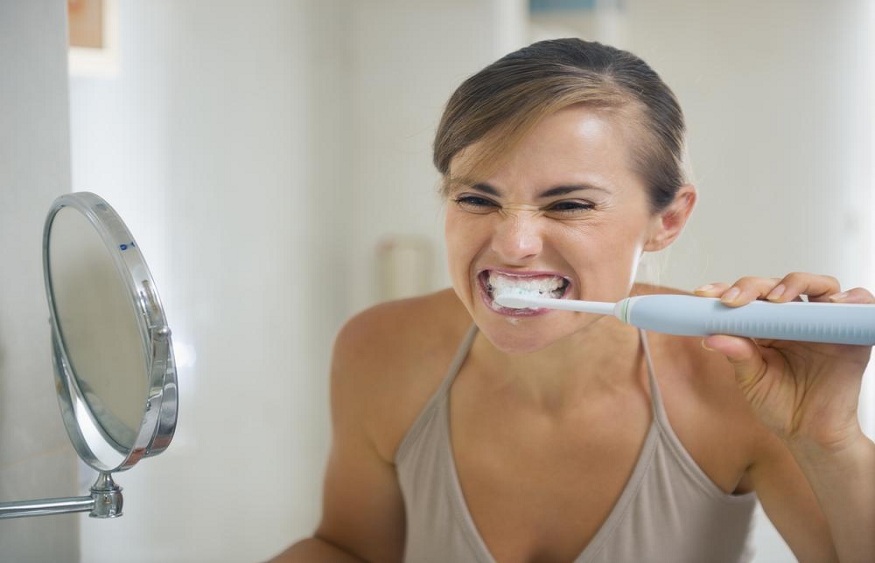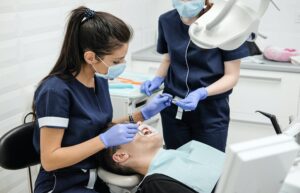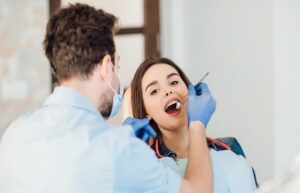You might think you already know how to clean your teeth the right way. This is a common mistake.
After all, don’t we all learn how to properly brush our teeth when we’re still very young? But you might be shocked to learn that people often have the wrong idea about how to brush their teeth.
Some people may have been taught things that were not true when they were younger. In other cases, mistakes crept in over time. Always make sure you know how to properly brush your teeth.
Steps how to brush your teeth properly
You probably already know how to clean your teeth, but would you say you’re an expert? Use this guide to improve your skill or see how much you know about how to brush your teeth properly.
Aim Toothbrush
After you put toothpaste on your toothbrush, turn the bristles so that they point 45 degrees away from your gumline.
Why? Because the brushes are at an angle, they can reach and clean the parts of your teeth that are usually covered by your gums.
If the angle is too shallow, the brushes of the toothbrush won’t be able to reach as far down your teeth.
If the angle is too steep, the bristles will poke and irritate your gums when they don’t need to.
Gently Scrub Your Teeth
Brushing your teeth can be done in a lot of different ways. Talk to your doctor or dental hygienist to find out the best way to brush your teeth.
You should also find out if a hand toothbrush or an electric toothbrush is better for your needs.
Brush your teeth for two minutes.
The best amount of time to brush your teeth is two minutes, but the quality of your brushing is more important than the amount of time you spend doing it.
If you don’t brush carefully, you might miss a spot. Divide the two minutes into four equal blocks of thirty seconds each, and focus on each corner of your mouth, starting with the top left corner and going clockwise to the top right, bottom left, and bottom right.
Don’t forget to fully brush your teeth on the inside, outside, and very top of your mouth. Do you need a timer or some ideas? Play your favorite song for two minutes while you brush your teeth. Don’t stop until the song is over.
Make sure that you brush your tongue
You should brush your mouth for sure. Brushing your tongue is important parts of getting rid of plaque because it helps get rid of bacteria in your mouth. This step should not be skipped, even if it seems strange to do so.
In addition, it will help you keep your mouth clean and your breath fresh. Find out more about how to make your breath smell better.
Tips how to brush your teeth properly
Brushing your teeth is an essential part of daily dental hygiene, and it’s a crucial aspect of maintaining good oral health.
But are you brushing your teeth properly? Proper brushing techniques can help prevent tooth decay, tooth fracture, gum disease, and bad breath. In this article, we’ll discuss tips on how to brush your teeth properly.
1. Use the right toothbrush
The first step to brushing your teeth properly is to choose the right toothbrush. Choose a toothbrush with soft bristles and a small head.
Soft bristles are gentle on your teeth and gums, and a small head can reach all the hard-to-reach areas in your mouth.
2. Use the right toothpaste
Toothpaste is a crucial part of brushing your teeth. Choose toothpaste that contains fluoride. Fluoride helps strengthen your teeth and prevents tooth decay.
Also, look for a toothpaste that contains antibacterial properties to help fight against bacteria in your mouth.
3. Brush for at least two minutes
Many people rush through brushing their teeth, but it’s essential to take your time. Brush your teeth for at least two minutes to ensure that you remove all the plaque and food particles from your teeth and gums.
4. Use the right technique
To brush your teeth properly, hold your toothbrush at a 45-degree angle to your gums. Use short, gentle strokes to brush your teeth, and don’t forget to brush your tongue and the roof of your mouth.
Be sure to brush all the surfaces of your teeth, including the fronts, backs, and tops of your molars.
5. Don’t brush too hard
Brushing your teeth too hard can cause damage to your gums and tooth enamel. Use a gentle touch when brushing your teeth to avoid causing damage to your mouth.
6. Don’t forget to floss
Brushing your teeth is essential, but it’s not enough. Flossing is an essential part of dental hygiene because it helps remove plaque and food particles that your toothbrush can’t reach. Floss at least once a day to ensure that your teeth and gums stay healthy.
7. Rinse your mouth
After brushing and flossing, rinse your mouth with water to remove any remaining toothpaste or food particles. You can also use an antiseptic mouthwash to kill any bacteria in your mouth.
8. Brush twice a day
Brush your teeth twice a day, once in the morning and once before bed. This ensures that you remove any food particles and bacteria that may have accumulated on your teeth during the day.
9. Use a timer
Using a timer can help ensure that you brush your teeth for the recommended two minutes. You can use a stopwatch or an electric toothbrush with a built-in timer.
10. Replace your toothbrush regularly
Replace your toothbrush every three to four months or sooner if the bristles start to fray. A worn-out toothbrush won’t clean your teeth properly, and it can even cause damage to your gums.
12. Avoid sugary and acidic foods and drinks
Sugary and acidic foods and drinks can erode your tooth enamel and lead to tooth decay. Avoid or limit your consumption of sugary and acidic foods and drinks, or rinse your mouth with water after consuming them.
12. Brush your teeth before eating
Brush your teeth before eating, not after. Brushing your teeth after eating acidic or sugary foods can actually damage your tooth enamel, so it’s best to brush beforehand.
13. Don’t share your toothbrush
Sharing your toothbrush can transfer bacteria from one person to another, increasing the risk of infection. Make sure everyone in your household has their own toothbrush.
Final words
Brushing your teeth regularly is critical to maintaining good oral health. Tooth problems like dental caries and toothache can be both expensive and excruciating to treat.
Brushing your teeth is the only way to remove the germs that make up plaque, which, if it is allowed to remain in place, may create cavity and gum disease. If you do not brush your teeth, these conditions will develop.
Because brushing your teeth is so important, it is critical that you take the time to ensure that you are doing it in the most effective way possible.




